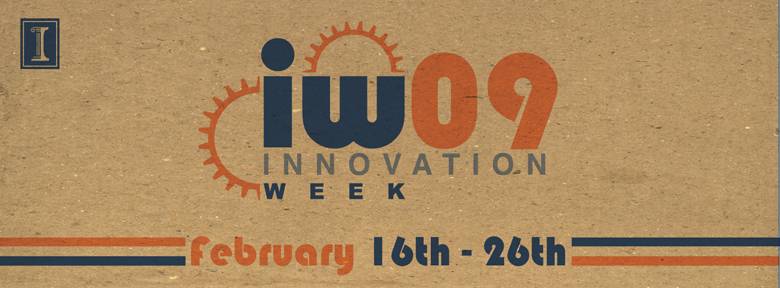
You live near a major university and a community college. There are smart people that come here every week to talk to the general public about interesting topics. Perhaps you were not aware of this fact, or were overwhelmed by the sheer number of opportunities for possible enlightenment. If that’s the case, Smile Politely understands and is here to help. Here are several events going on in town this week. Check out one or more of them if you have time.
If you have a community event, speaker, or film event that you’d like to see featured on Listen Up!, send the event information to joelgillespie [at] smilepolitely [dot] com by Friday the week prior to the event. Listen Up! runs Mondays at noon.
WHAT: Innovation Week
WHEN: Tuesday, Feb. 17 to Wednesday, Feb. 25
WHERE: Various Locations
Check out the Innovation Week website for the full slate of events. Here are a few highlights from this week (we’ll detail the final three days’ events next Monday):
- Entrepreneur-in-Residence Glenn Winokur — a 20-year veteran of the software industry — will make several appearances on Tuesday and Wednesday
- Dan Formosa and Agneta Enga of SmartDesign will speak on various design-related topics on Wednesday evening in Room 228 of the Natural History Building
- Unwind from a week of entrepreneurship with the TEC’s First Annual Entrepreneur Film Fest on Sunday at The Savoy 16 Theaters: Robots at 12:30 p.m., Ghostbusters at 2:40 p.m., and Iron Man at 5 p.m.
WHAT: “Nuclear Reactor Acquisition in the Middle East and West Africa” by Dr. Cliff Singer, Professor of Nuclear Plasma & Radiological Engineering, UIUC
WHEN: Tuesday, Feb. 17, 12 noon
WHERE: Lucy Ellis Lounge (room 1080), Foreign Language Building
Smile Politely: Why do you concentrate on the Middle East and West Africa for your talk?
Dr. Cliff Singer: I work on energy futures and the potential role of nuclear reactors therein world-wide. The talk focusses on the Middle East and West Africa because I have been working recently on countries that do not yet have nuclear electric power production reactors and the talk is for the Center for South Asia and Middle Eastern Studies. The overlap of these interests is in the Middle East, and by extension predominantly Arab states in North Africa
SP: Is there a lot of overlap between the acquisition of nuclear reactors and the production of nuclear weapons?
CS: Acquisition of commercial nuclear electric power production can provide a technology base for potential development of nuclear explosives, and this potential has “strategic” implications even if the countries that acquire it do not have active programs for actually producing nuclear explosives.
SP: Is your talk intended mainly for an academic audience? What would you hope a non-academic would glean from your talk?
CS: I will be showing graphs with results of econometric analysis, but not describing the methodology used to produce them. There will also be a non-technical discussion of the implications of the results. Thus, the talk should be of general interest.
WHAT: Forum on Global Food Security: Achieving Global Food Security: Agricultural Development and Trade Policy Needs
WHEN: Wednesday, Feb. 18, 12 noon to 3 p.m.
WHERE: Room 404, lllini Union
From the campus calendar listing: Panel Speakers include: John Ulimwengu, International Food Policy Research Institute, Washington DC: A Blueprint for African Agricultural Development; Tom Bassett, Geography, UI: The Geography of World Hunger; Noreen Sugrue, WGGP, UI: Global Food Insecurities: Maternal and Child Health Consequences; Paul McNamara, ACE and Division of Nutritional Sciences, UI: Food Security in the Context of HIV and AIDS; Gale Summerfield, WGGP, UI: Moderator
WHAT: “Nonproliferation Export Controls in Argentina” by Evangeline Reynolds, Ph.D. student, Department of Political Science, UIUC
WHEN: Thursday, Feb. 19, 12 noon to 1 p.m.
WHERE: 356 Armory Building
From the campus calendar listing: Argentina may be the most engaged Latin American country on the issue of nonproliferation export controls. While based in Buenos Aires, Evangeline studied the nonproliferation export controls system of Argentina in 2008 via interview and document sources. In her presentation, she will outline how the export licensing system currently works and interacts with the international export control community. She will also discuss the development of the system, reflecting on the domestic and international pressures which shaped it.








